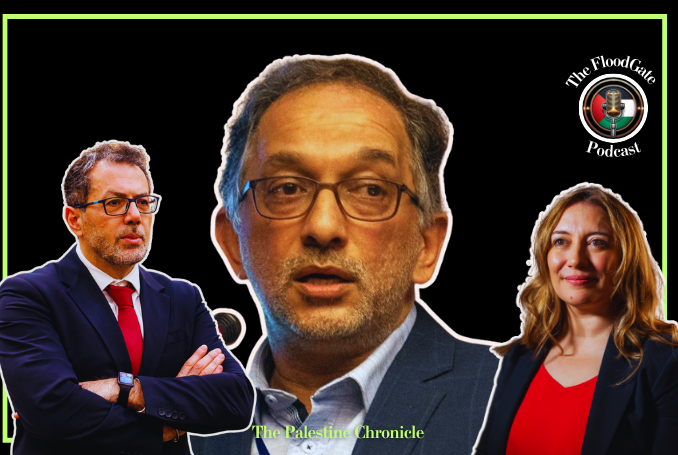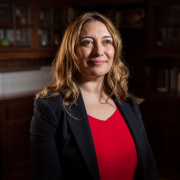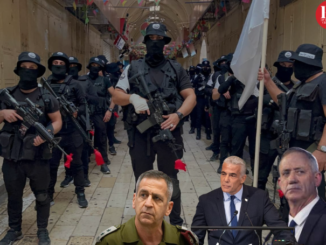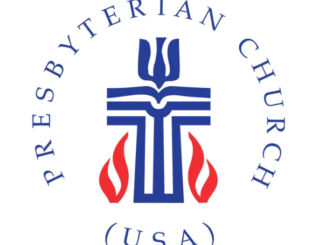
By Romana Rubeo 
Na’eem Jeenah draws parallels between South Africa’s anti-apartheid struggle and Palestine’s fight against Israeli occupation, highlighting seven key insights.
In the latest episode of the FloodGate podcast, Ramzy Baroud and I delved into the intricacies of South Africa’s foreign policy with Na’eem Jeenah, veteran anti-apartheid activist and leading voice in the South Africa–Palestine solidarity movement.
Below are seven main takeaways from the interview.
1. Relations with the United States
The expulsion of South Africa’s ambassador to the US, Ibrahim Rasul, served as a focal point in the discussion. Jeenah contended that this incident reflected US attitudes towards South Africa more than it did Rasool’s qualifications or actions.
“Frankly, it doesn’t matter who South Africa sends as an ambassador to the United States. The treatment he or she will receive will be the same — well, maybe it might be a little different if the person is white and Afrikaner — but the treatment will generally be the same. And the reason for that is that this is not about Ibrahim Rasool; this is about South Africa.”
“South Africa is in the American crosshairs,” Jeenah.
2. Evolving Relationship with Palestine
Jeenah outlined an evolution in South Africa’s relationship with Palestine post-apartheid. Initially, South Africa aimed for a mediating role between Israelis and Palestinians.
However, significant developments, including Hamas’ electoral victory, necessitated a shift towards actively supporting a wider array of Palestinian voices beyond the traditional Palestinian Authority.
This change underscored increasing grassroots support and advocacy for Palestinian rights within South Africa, contrasting sharply with some Arab states that were normalizing ties with Israel.
According to Jeenah, “there were two things that also happened in the ANC. One was: there started being a discussion about — even though the official government position was that, you know, that we take a position that is a multilateral one, etc., and hence we support a two-state solution — is a government position. But within the ANC there was talk about, ‘Well, we should start talking about a one-state solution. Is it something that we should be supporting?’”
3. Maturity in Foreign Policy
The current South African government’s approach was marked by a profound solidarity with Palestinian struggles against colonialism, indicative of a matured foreign policy stance.
Jeenah posited that this assertiveness in promoting Palestinian rights stemmed from an acknowledgment of the importance of empowering all political movements.
“What South Africa should be doing is not trying to rehash this mediation nonsense that South Africa’s role is to support Palestinians in the struggle um against Israeli apartheid, colonialism and occupation, and one way of doing that is to bring Palestinian groups together,” he said.
4. Role of International Law
The interview tackled South Africa’s distinctive position on the world stage as an advocate for Palestinian rights while criticizing the inconsistencies in US foreign policy.
Jeenah discussed the role of international law and its historical bias towards Northern states, expressing concern over how this affected the Global South.
Despite South Africa’s symbolic significance in Palestine’s struggle, its actual impact had been limited in terms of mass mobilization compared to other countries.
“International law has kind of been and was designed as the preserve for northern states, for European states, essentially,” he said.
“And they were talking about the rules of war, and international law, as it later developed into the so-called ‘rules-based order’ after the Second World War—all of these things were meant to regulate how European nations or nations of the global north related to each other. It wasn’t meant for ‘uncivilized’ people. Uncivilized people were just meant to be put in their place.”
“Now, for South Africa, we, you know, have always, from 1994, insisted there must be a reform of the international system, there must be multilateralism, and international law applies to us all. In 2023, this came to a head. This was an opportunity to say this properly on the global stage—that international law and the international legal system are ours too, that we can also use it,” Jeenah concluded.
5. South Africa and the Global South
Post-2023, South African organizations supporting Palestine, such as South African Jews for Free Palestine, had seen increased engagement.
Jeenah acknowledged South Africa’s foundational reliance on U.S. trade but also noted the country’s growing independence through alliances like BRICS.
He recognized economic vulnerabilities resulting from potential US aid withdrawal.
“South Africa is vulnerable mainly because our economy is not as strong as we would like it to be. Our main challenges for years now are the level of inequality in South Africa, the deepening poverty,” he said.
“So, these are very strong developmental challenges, very deep. We have an economy that’s not able to deal with these in the next few years, and we have to work on that. So, from that perspective, South Africa is vulnerable. Right? But at the same time, South Africa is less vulnerable than many other states,” he said, arguing that support for Palestine strengthened South Africa’s ties within the Global South.
6. Resistance and Anti-Apartheid Parallels
Jeenah sharply critiqued Western narratives that misrepresented the anti-apartheid struggle, advocating for a multi-faceted understanding of resistance.
He drew parallels between South African and Palestinian experiences of oppression, affirming that international law justified resistance against colonialism by any means necessary.
“I would get these young Zionists, who were not even born, some of them, in 1994, who would say things like, you know, ‘If only the Palestinians followed Mandela’s example and engaged in peaceful…’ (…) For God’s sake, don’t insult Mandela!” he said.
“And I often say, you know, my brother, when he was found dead on the streets in Durban, he wasn’t lying there with a banner that said, ‘Peaceful resistance.’ There was an AK-47 next to his body. So don’t insult my brother either!”
“This notion that South Africa won our liberation through—and it was very clean and peaceful, and no… No, Mandela wasn’t Gandhi. Mandela was arrested and sentenced to life imprisonment because he was the founder of Umkhonto we Sizwe, the armed wing of the ANC, not because he carried a white banner,” he concluded.
7. Solidarity Movement and Future Steps
Acknowledging current hurdles in African solidarity with Palestine due to geopolitical complexities and internal conflicts among African nations, Jeenah stressed the potential to utilize existing human rights frameworks to challenge injustices.
He called for proactive measures from the South African solidarity movement, including halting coal exports to Israel and holding accountable South African citizens participating in the Israeli military. He urged the South African government to adopt a more robust stance in support of Palestine.
“In terms of trade, so after Colombia stopped exporting coal to Israel, South Africa is now the largest exporter of coal to Israel. Right, that needs to stop. I mean, we are energizing, really, the genocide in some ways, right? That needs to stop,” Jeenah said.
“The other area is that, as I said earlier on, we have the Jewish community in South Africa, the most Zionist community in the world, outside of Israel, right? And so, as part of that, a number of young South African Jews and others go to Israel to fight in the occupation forces. Many of them have made videos of themselves now, during the genocide. They need to be prosecuted when they come back to South Africa.”
“These two are big things that the South African government needs to do. Moving beyond all the plaudits that it receives for the ICJ case, domestically, this needs to happen for the government to say clearly that we are on the side of right in terms of international law and in terms of domestic law,” Jeenah concluded.
(The Palestine Chronicle)

– Romana Rubeo is an Italian writer and the managing editor of The Palestine Chronicle. Her articles appeared in many online newspapers and academic journals. She holds a Master’s Degree in Foreign Languages and Literature and specializes in audio-visual and journalism translation.








Be the first to comment